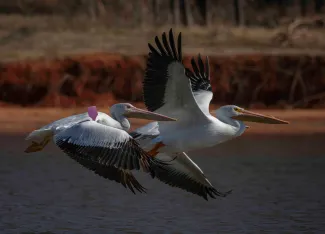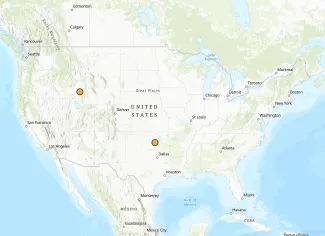Nature photographer Stephen Ofsthun likes to use his images to surprise people with Oklahoma's natural diversity and beauty. But a few images, taken in February 2022 at Lake Thunderbird State Park, surprised even him.

A tagged American white pelican in flight at Lake Thunderbird State Park.
"I had gone to Lake Thunderbird to look for bald eagles and found about 200 pelicans instead," Ofsthun said. "I got several photos of the birds in flight, but it wasn't until I got home and looked at the images that I realized one of the birds was tagged!"
The bird had a purple tag with the number 348 on each wing and a metal leg band that had rotated so that the 9-digit identification number wasn't visible in the photographs. Ofsthun later reported the tag and sighting details to the U.S. Geological Survey's Bird Banding Laboratory, North America's central repository for banding records.
"They sent a certificate that showed the bird had been banded in Idaho in 2020 when it was too young to fly!"

American white pelicans are most numerous and noticeable in Oklahoma during their spring and fall migrations to and from their more northern nesting grounds, but small numbers of non-breeding birds can be found in the state year-round.
While the exact journey of the tagged pelican from Idaho to Oklahoma remains unknown, the Bird Banding Laboratory did shed light on this tagged bird's origin story. American white pelican "348" was hatched in 2020 at a colony in Chesterfield Reservoir, Idaho - a straight-line distance of 950 miles from Lake Thunderbird. That summer, Idaho Department of Fish and Game banded and tagged the bird, along with 210 other young pelicans, as part of a study of Idaho's pelican population.

"We discovered a new pelican colony at Chesterfield in the spring of 2020," said Colleen Moulton, the Avian Ecologist for Idaho Department of Fish and Game. "We had banded young pelicans at other colonies in Idaho since 2007, but #348 likely represents one of the first pelicans to fledge from this location. It's exciting to hear that the bird is still alive and well, as we have not received any other sightings of it since it was banded.
"Although most members of its cohort have been spotted in the southwest U.S. and Mexico, a handful of them have shown up a bit further east. In fact, one of its fledging mates was also spotted in Oklahoma, back in November 2020, at Salt Plains State Park."
Learning the origin story of this banded bird has inspired Ofsthun to look for and report other banded birds he may see.
"I've never spotted a tagged or banded bird before," Ofsthun said. "I'm definitely going to keep my eyes open and check my other bird photos for a band. This has all been a pretty cool experience - not only seeing the tagged bird but finding out that it was tagged all the way in Idaho!"